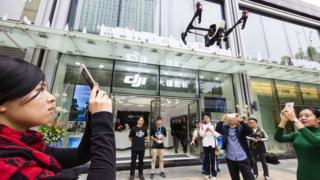Do Chinese drones pose a threat to US?
US officials may put an end to a civilian drone programme because of their concerns about the unmanned aerial vehicles that are made in China. The officials are apparently worried that the Chinese-made drones could be used to spy on people in the US.
After a volcano exploded in Hawaii in May 2018, US scientists used drones to save a man from the lava: “Follow the drone,” they said. He made it through the jungle.
Drones save people. They also map terrain, survey land and inspect pipelines. The scientists use drones for these and other purposes on a daily basis, and they have bragged about their successes in the field.
Many of the aircraft are made by Chinese companies, though. They are now grounded because of concerns about espionage.
The drones had been deployed for years by the scientists and others at the US Department of the Interior, a federal agency that manages national parks and other duties. But the head of the federal agency, David Bernhardt, is apparently now worried that the drones could be used for espionage.
He is examining the agency’s civilian drone programme in an effort to determine whether or not it should be continued. During this time, many of the drones are grounded, according to an agency spokeswoman, Melissa Brown. “Until this review is completed, the secretary has directed that drones manufactured in China or made from Chinese components be grounded,” according to a statement she sent to the BBC.
Drones that are used to fight fires and help rescue people are still allowed to fly, she added. News of the fleet’s grounding was first reported in the Financial Times.
Mr Bernhardt’s review of the drone programme reflects a growing concern among US officials about Chinese technology and espionage.
President Donald Trump has spoken in dark terms about China, saying that its leaders have “cheated” the US and that its intelligence agents spy on people here. Chinese officials deny the accusations. Despite the rhetoric, US-China relations have improved.
On Wednesday, Trump is planning to sign an initial trade deal with Chinese leaders. Still, fundamental issues remain, such as the fight over technology. US officials have said in the past that Huawei, the telecommunications company, and other Chinese companies could pose a security threat.
Some Chinese analysts say the fight is not over national security but market share. The Chinese are better at making products, they say, and Americans are jealous. The Chinese analysts see the US policies as a form of protectionism.
The drones are now at the centre of the US-China dispute.
Many of the drones that are used by US scientists are made by a Shenzhen-based company called Da Jiang Innovations Science and Technology Company, or, DJI. The company dominates the drone market, according to a research company, Skylogic.
US officials have in the past expressed concerns about DJI. Agents at a US immigration office said in 2017 that the company’s drones could collect information about US sites and transmit data back to Beijing.
Rules and norms are different for private companies in China than they are in the US. Business executives in China stay in close contact with government officials. US officials worry about the information that Chinese drones could collect and what might be done with the data.
The Chinese executives could pass the data on to Beijing officials, explains Sarah Cook, a senior analyst with Freedom House, a non-profit organisation.
Executives who work for DJI say their drones are trustworthy. Michael Oldenburg, a spokesman for DJI Technology Inc, tells the BBC there is no “credible evidence to support a broad country-of-origin restriction on drone technology”.
Many US analysts agree with Oldenburg’s assessment. “I doubt the Chinese government is using the drones to conduct massive surveillance,” says David Fidler, an adjunct senior fellow at the Council on Foreign Relations.
Fidler and others admit it is impossible to know how much information the drones are gathering, however. Analysts emphasise that the Chinese officials pose a threat to the US and that Chinese companies should be banned from certain kinds of work.
“I wouldn’t want a Chinese server operating our nuclear system,” says Paul Rosenzweig, a senior fellow at the conservative R Street Institute who served as a US Department of Homeland Security official during the George W Bush White House years.
Yet Rosenzweig and others say that the drones seem benign. The aircraft fly over wildlife areas and parks and are unlikely to collect sensitive data. “It is an acceptable risk,” Rosenzweig says, adding: “I don’t think drones covering Yosemite National Park are a real threat.”
The real assessment, the one from the secretary of the interior, is yet to be announced, however. In the meantime, scientists and others wait – and wonder – about the fate of the drones.
Source: Read Full Article



